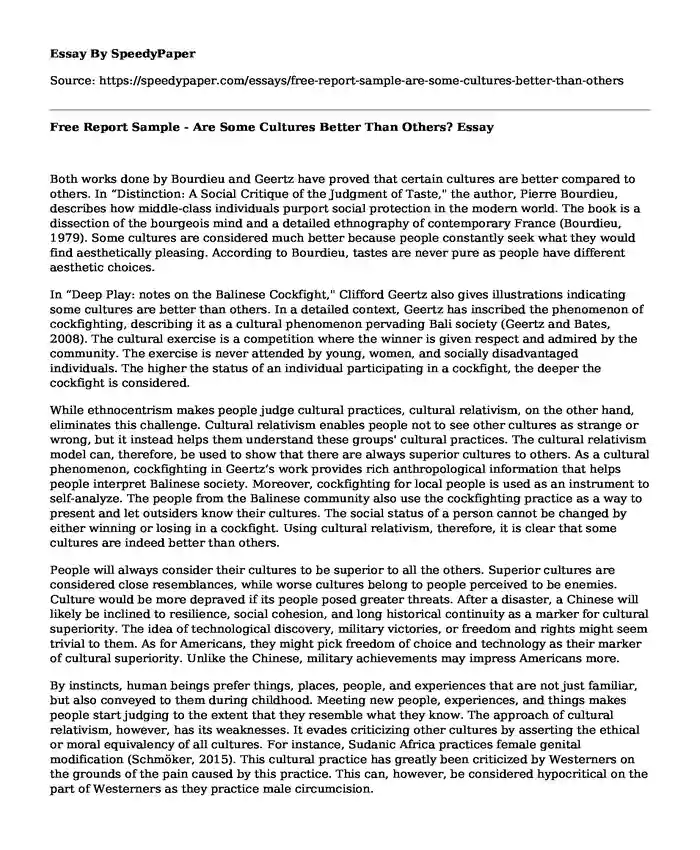Both works done by Bourdieu and Geertz have proved that certain cultures are better compared to others. In “Distinction: A Social Critique of the Judgment of Taste," the author, Pierre Bourdieu, describes how middle-class individuals purport social protection in the modern world. The book is a dissection of the bourgeois mind and a detailed ethnography of contemporary France (Bourdieu, 1979). Some cultures are considered much better because people constantly seek what they would find aesthetically pleasing. According to Bourdieu, tastes are never pure as people have different aesthetic choices.
In “Deep Play: notes on the Balinese Cockfight," Clifford Geertz also gives illustrations indicating some cultures are better than others. In a detailed context, Geertz has inscribed the phenomenon of cockfighting, describing it as a cultural phenomenon pervading Bali society (Geertz and Bates, 2008). The cultural exercise is a competition where the winner is given respect and admired by the community. The exercise is never attended by young, women, and socially disadvantaged individuals. The higher the status of an individual participating in a cockfight, the deeper the cockfight is considered.
While ethnocentrism makes people judge cultural practices, cultural relativism, on the other hand, eliminates this challenge. Cultural relativism enables people not to see other cultures as strange or wrong, but it instead helps them understand these groups' cultural practices. The cultural relativism model can, therefore, be used to show that there are always superior cultures to others. As a cultural phenomenon, cockfighting in Geertz’s work provides rich anthropological information that helps people interpret Balinese society. Moreover, cockfighting for local people is used as an instrument to self-analyze. The people from the Balinese community also use the cockfighting practice as a way to present and let outsiders know their cultures. The social status of a person cannot be changed by either winning or losing in a cockfight. Using cultural relativism, therefore, it is clear that some cultures are indeed better than others.
People will always consider their cultures to be superior to all the others. Superior cultures are considered close resemblances, while worse cultures belong to people perceived to be enemies. Culture would be more depraved if its people posed greater threats. After a disaster, a Chinese will likely be inclined to resilience, social cohesion, and long historical continuity as a marker for cultural superiority. The idea of technological discovery, military victories, or freedom and rights might seem trivial to them. As for Americans, they might pick freedom of choice and technology as their marker of cultural superiority. Unlike the Chinese, military achievements may impress Americans more.
By instincts, human beings prefer things, places, people, and experiences that are not just familiar, but also conveyed to them during childhood. Meeting new people, experiences, and things makes people start judging to the extent that they resemble what they know. The approach of cultural relativism, however, has its weaknesses. It evades criticizing other cultures by asserting the ethical or moral equivalency of all cultures. For instance, Sudanic Africa practices female genital modification (Schmöker, 2015). This cultural practice has greatly been criticized by Westerners on the grounds of the pain caused by this practice. This can, however, be considered hypocritical on the part of Westerners as they practice male circumcision.
Bibliography
Bourdieu, Pierre. 1979. Distinction.
Geertz, Clifford, and Wesley W Bates. 2008. Deep Play. Louisville: Contre Coup Press.
Schmöker, Annika. 2015. "Female Genital Mutilation – Why Does It Still Exist In Africa?". Scienceopen Research. doi:10.14293/s2199-1006.1.sor-med.acoxmi.v1.
Cite this page
Free Report Sample - Are Some Cultures Better Than Others?. (2024, Jan 08). Retrieved from https://speedypaper.net/essays/free-report-sample-are-some-cultures-better-than-others
Request Removal
If you are the original author of this essay and no longer wish to have it published on the SpeedyPaper website, please click below to request its removal:
- The Age of Online Reputation Management, Essay Sample for Everyone
- Free Essay Answering How Diversity Change Interaction in the Workplace
- Essay Example: Nurse's Cultural Background and Impact on Care
- Paper Example. The Generational Gap
- Essay Example - Marjorie Shostak's Approach to Culture
- Essay Example on Revamping Healthcare in Tehachapi Valley: Introducing Virtual Caregiving
- The Importance of Pastoral Theology in the 21st Century - Essay Example
Popular categories





